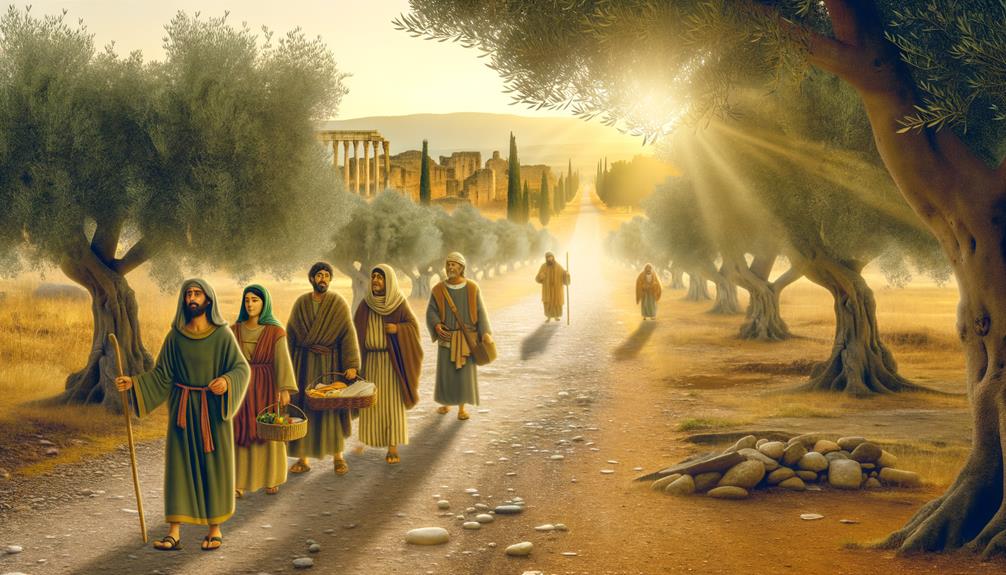The Way In The Bible Meaning: Path to Salvation
‘The Way‘ in the Bible signifies a profound spiritual journey, deeply rooted in both the Old and New Scriptures. It emphasizes a path of divine guidance and moral integrity, as illustrated in Proverbs and Psalms.
In the New Scriptures, the term describes the early followers of Jesus Christ, highlighting their distinct identity and commitment to His teachings. Jesus himself declared, ‘I am the way, the truth, and the life’ (John 14:6), underscoring Him as the path to spiritual reconciliation and eternal life.
This term encapsulates the essence of living according to biblical principles, offering a rich terrain of spiritual exploration.

The Way in the Bible: Spiritual Meaning and Biblical Significance
| Aspect | Description |
|---|---|
| Biblical Reference | Acts 9:2; John 14:6 |
| Meaning | Represents the teachings and path of Jesus Christ |
| Symbolism | Guidance, truth, life, and righteousness |
| Early Christianity | “The Way” was the term used for early followers of Jesus |
| Spiritual Insight | Choosing to follow God’s direction and live according to His principles |
Biblical Origins of ‘The Way’

The term ‘The Way‘ finds its biblical origins in the New Scriptures, primarily within the Acts of the Apostles, where it is used to describe the early followers of Jesus Christ and their distinctive lifestyle and beliefs.
This phrase encapsulates the commitment to living according to Jesus’ teachings, emphasizing a path of righteousness, community, and faith. The expression is not merely a label but signifies a transformative journey marked by spiritual growth and moral rectitude.
Acts 9:2 and Acts 19:9 illustrate how ‘The Way’ became a defining characteristic of the nascent Christian identity, setting them apart in a pluralistic society.
This nomenclature underscores the holistic integration of belief and practice, reflecting an embodied faith central to the early Christian experience.
‘The Way’ in Old Testament

While ‘The Way‘ is prominently featured in the New scriptures, its conceptual roots can be traced back to the Old scriptures, where the term often denotes a divine path of obedience and wisdom.
In the Old Covenant, ‘The Way’ symbolizes a journey aligned with God’s commandments and precepts. Proverbs 3:6 advises, ‘In all your ways acknowledge Him, and He will make your paths straight,’ emphasizing trust and divine guidance.
Similarly, Psalm 119:105 declares, ‘Your word is a lamp to my feet and a light to my path,’ illustrating the illuminating power of God’s word.
These scriptures underscore a life directed by divine wisdom and moral integrity, forming a foundational understanding of ‘The Way’ in biblical theology.
‘The Way’ in New Testament

In the New Covenant, ‘The Way‘ frequently signifies the early Christian movement and the path of discipleship under Jesus Christ.
This term, prominently featured in Acts, encapsulates the followers’ commitment to living according to Jesus’ teachings and example. The phrase underscores a transformative journey, emphasizing ethical conduct, communal living, and spiritual growth.
It reflects the distinct identity and mission of the nascent Christian community, distinct from both Judaism and paganism. This conceptualization of ‘The Way’ not only represents a physical path but also a holistic way of life, marked by faith, obedience, and resilience.
Consequently, ‘The Way’ becomes a defining characteristic of early Christian identity, encapsulating their devotion and distinctiveness in a diverse religious landscape.
Jesus as ‘The Way’

Understanding ‘The Way‘ within the New Covenant framework naturally leads to examining how Jesus Himself embodies and defines this path.
In John 14:6, Jesus states unequivocally, ‘I am the way, and the truth, and the life. No one comes to the Father except through me.’ This declaration positions Jesus as the exclusive conduit to divine fellowship.
The path He offers is not merely a set of teachings but a relational journey with Him at its center. His life, sacrificial death, and resurrection provide the foundational elements of this way, illustrating a transformative process that aligns believers with God’s will.
Essentially, Jesus as ‘The Way’ encapsulates both the means and the meaning of spiritual reconciliation and eternal life.
Early Christians and ‘The Way’

As the early Christian movement emerged, followers of Jesus were often referred to as adherents of ‘The Way,’ signifying their distinct path of faith and practice rooted in His teachings.
This term, found in Acts 9:2, encapsulated the transformative journey of living according to Christ’s example. It was a holistic approach to life, emphasizing discipleship, community, and moral integrity.
‘The Way’ demarcated early Christians from other Jewish sects and pagan religions, underscoring their commitment to Jesus as the Messiah. This identity fostered a sense of unity and purpose among believers, as they navigated a world often hostile to their beliefs.
Consequently, ‘The Way’ not only defined their spiritual direction but also shaped their collective ethos and mission.
‘The Way’ and Righteousness

Integral to ‘The Way’ is the pursuit of righteousness, which encompasses living in accordance with God’s will and embodying the ethical and moral teachings of Jesus Christ.
Righteousness in this context refers to an adherence to divine laws, promoting justice, mercy, and humility. Followers of ‘The Way’ endeavor to reflect Christ’s love and compassion through their actions and decisions.
This pursuit is not merely about personal piety but extends to social justice, fostering community and peace. By aligning their lives with Christ’s example, believers aim to manifest God’s kingdom on earth.
This holistic approach underscores that righteousness is both a personal and communal endeavor, deeply rooted in scriptural mandates and Christ’s teachings.
Divine Guidance in ‘The Way’

Central to the pursuit of righteousness is the reliance on divine guidance, which illuminates ‘The Way‘ and directs believers in their journey to live according to God’s will. This guidance is often perceived through scripture, prayer, and the inner prompting of the Holy Spirit.
Biblical texts such as Psalm 119:105, ‘Your word is a lamp to my feet and a light to my path,’ emphasize the essential role of God’s word in providing direction.
Through divine guidance, followers are equipped to navigate life’s complexities, making decisions aligned with spiritual principles.
It is this divine illumination that transforms ‘The Way’ from a mere path to a sanctified journey, fostering a deeper connection with the divine and a more purposeful existence.
Spiritual Journey of ‘The Way’

The spiritual journey of ‘The Way’ represents a transformative pilgrimage that intertwines personal faith with communal obedience to divine principles. This path, deeply rooted in biblical narratives, emphasizes a continual process of spiritual growth and alignment with God’s will.
Believers are called to experience an inward renewal that reflects outwardly in their actions and interactions within the faith community. The journey is marked by stages of spiritual maturation, where initial belief evolves into deeper understanding and more profound expressions of faith.
This pilgrimage is not solitary; it is supported by the shared experiences and teachings of the community, fostering a collective pursuit of holiness. The spiritual journey on ‘The Way’ consequently encapsulates both individual transformation and collective fidelity to God’s commandments.
Moral Integrity and ‘The Way’

As believers progress along ‘The Way’, the cultivation of moral integrity becomes indispensable, reflecting their commitment to living out the divine principles that guide their spiritual journey.
Moral integrity in this regard entails a steadfast adherence to biblical teachings, which not only enriches personal faith but also serves as a beacon to others.
This path is marked by:
- Honesty: Upholding truth in all situations, reflecting the transparency of Christ.
- Compassion: Demonstrating love and kindness, mirroring Jesus’ empathy.
In essence, moral integrity aligns believers’ actions with their faith, ensuring that their journey along ‘The Way’ is both authentic and transformative.
‘The Way’ in Modern Faith

In the context of modern faith, ‘The Way‘ continues to guide evolving spiritual paths, reflecting the dynamic nature of contemporary Christian practices.
By examining how believers interpret and apply ancient teachings today, we can gain insights into the relevance and adaptation of ‘The Way’ in modern life.
This exploration offers an extensive understanding of how scriptural principles are integrated into the diverse, daily practices of today’s faith communities.
Evolving Spiritual Paths
Amidst the complexities of contemporary spirituality, ‘The Way’ serves as a poignant symbol for the evolving paths of modern faith. This concept, rooted in biblical tradition, now encompasses diverse interpretations, reflecting the dynamic nature of spiritual journeys today.
As individuals seek deeper meaning and connection, ‘The Way’ offers a framework that adapts to various personal and communal experiences. Key elements shaping these paths include:
- Interfaith Dialogue: Emphasizing mutual respect and understanding between different religious traditions.
- Spiritual but Not Religious (SBNR): A growing demographic seeking spirituality outside organized religion.
These aspects highlight how ‘The Way’ continues to inspire and guide evolving spiritual practices in a complex world.
Contemporary Christian Practices
Building on the diverse spiritual paths discussed, contemporary Christian practices demonstrate how ‘The Way’ adapts to modern faith contexts, influencing worship, community engagement, and personal devotion.
Worship services now often incorporate multimedia, contemporary music, and interactive sermons, reflecting a shift towards engaging congregations more dynamically.
Community engagement extends beyond traditional boundaries through social media, fostering global connections and outreach.
Personal devotion has also evolved, with digital devotionals, prayer apps, and online Bible studies providing accessible spiritual nourishment.
These adaptations illustrate a responsive faith that aligns with technological advancements and societal changes, while maintaining core Christian principles.
Consequently, ‘The Way’ persists as a living tradition, continually reshaped to meet the needs of contemporary believers.
Modern Interpretations Explained
Exploring ‘The Way’ in modern faith reveals a dynamic interpretation that integrates traditional beliefs with contemporary societal contexts, offering a nuanced understanding of Christian discipleship today.
This multifaceted approach acknowledges the complexity of practicing faith in an ever-evolving world. Modern interpretations emphasize:
- Inclusivity: Embracing diverse backgrounds and perspectives within the Christian community.
- Social Justice: Advocating for equality and human rights as core tenets of living ‘The Way.’
These elements reflect a shift from purely historical doctrines to a more adaptable and responsive faith practice.
Living According to ‘The Way

Living according to ‘The Way‘ necessitates a commitment to emulating Jesus’ teachings and seeking spiritual and moral guidance as outlined in scripture.
This path involves not only understanding the principles Jesus espoused but also integrating them into daily life to reflect genuine faith.
Emulating Jesus’ Teachings
Emulating Jesus’ teachings, often referred to as living according to ‘The Way,’ involves a profound commitment to the principles of love, compassion, and humility as outlined in the Gospels.
This emulation is not merely an intellectual exercise but a transformative lifestyle rooted in everyday actions and decisions.
To live as Jesus did, one must integrate these core principles:
- Love: Expressing unconditional love towards others, regardless of their background or circumstances.
- Compassion: Demonstrating empathy and providing support to those in need, mirroring Jesus’ acts of healing and kindness.
Each of these elements forms the bedrock of a life dedicated to following ‘The Way.’
Spiritual and Moral Guidance
Spiritual and moral guidance derived from ‘The Way’ offers a blueprint for ethical living that is deeply anchored in the teachings of Jesus Christ.
Central to this guidance is the emphasis on love, compassion, and humility, as exemplified by Jesus’ life. By adhering to these principles, followers find a framework for steering through moral dilemmas and fostering interpersonal relationships.
The Sermon on the Mount, for instance, encapsulates key ethical teachings: loving one’s enemies, acting with integrity, and seeking justice.
In addition, spiritual disciplines such as prayer and meditation further ground believers in ‘The Way,’ encouraging a life of introspection and devotion.
Ultimately, ‘The Way’ shapes a path that aligns moral actions with divine will, promoting a harmonious and just society.
Conclusion
The concept of ‘The Way’ holds profound significance throughout biblical texts, symbolizing a path of spiritual, moral, and communal integrity.
From its Old Scripture roots to its New Scripture fulfillment in Jesus, ‘The Way’ has guided believers in their faith journey.
How does this ancient path continue to influence modern faith practices?
By living according to ‘The Way,’ individuals can embody the timeless principles of righteousness and devotion, enriching both personal spirituality and communal life.






